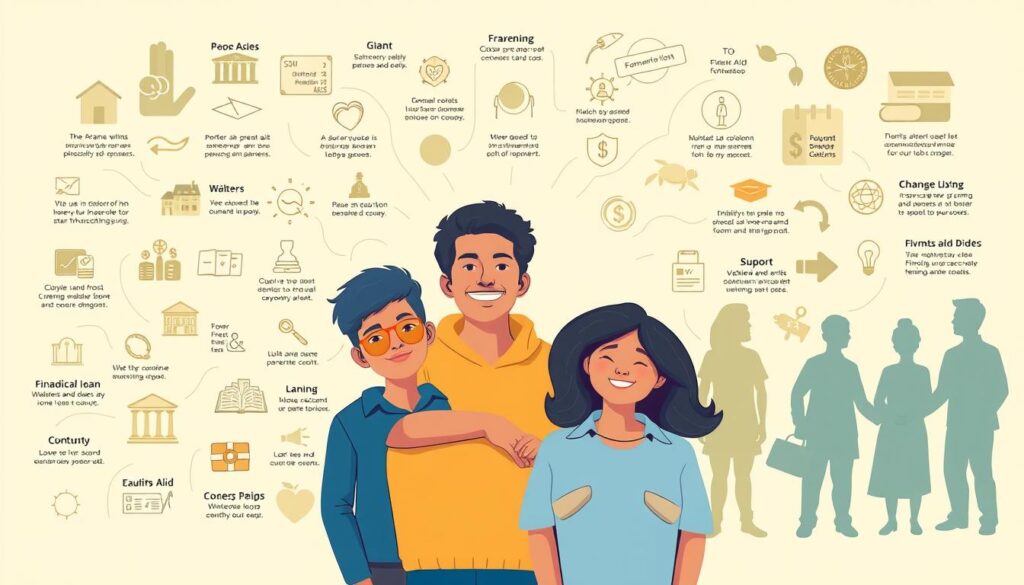Loans for Bad Credit: A Complete Guide
Did you know that nearly 30% of Americans face credit issues? This makes it hard to get a loan when you need one. If you’re in this situation, you’re not alone. We get how tough it is to deal with bad credit and find financial help.
At reputable lending institutions, people with bad credit can still get loans. We’re here to help you understand your options. We’ll give you the info you need to make smart choices about your money.
Key Takeaways
- Knowing your credit score is key for loan eligibility.
- Guaranteed approval loans are out there for bad credit holders.
- Different lenders offer various loan terms and conditions.
- Loan amounts and APRs change based on the lender and your credit score.
- It’s important to carefully check loan terms before you agree.
Understanding Bad Credit Scores
A bad credit score can make it hard to get a loan. It’s important to know what it means. Your credit score is a three-digit number that shows if you’re a good borrower. It helps lenders decide if you can get a loan and what interest rate you’ll pay.
What Is a Bad Credit Score?
A bad credit score is between 300 and 579. This score tells lenders you might be a risk. It can mean you can’t get credit easily or get worse loan terms. Knowing what makes a bad score is key to improving it.
How Credit Scores Are Calculated
Credit scores are based on several things. These include how you pay bills, how much credit you use, and how long you’ve had credit. The FICO score is the most common. It looks at:
- Payment history (35%)
- Credit utilization (30%)
- Length of credit history (15%)
- Credit mix (10%)
- New credit (10%)
For more info on credit, check out the Federal Trade Commission’s guide on understanding your.
Common Reasons for Bad Credit
There are many reasons for bad credit. Common ones include missing payments, using too much credit, and accounts being sent to collections. Identity theft can also hurt your score. Knowing these reasons can help you work on improving your credit.
Types of Loans Available for Bad Credit
Having bad credit can limit your loan choices. But, there are still many options available. Knowing your options is key when your credit score isn’t perfect.
Personal Loans
Personal loans are a common choice for those with bad credit. They offer various loan amounts and flexible repayment plans. You can use them for many things, like paying off debt or financing home improvements.
When looking at a bad credit personal loan, compare rates and terms from different lenders. This way, you can find the best deal. Some lenders focus on helping people with poor credit, so it’s worth checking them out.
Secured Loans
Secured loans need collateral, like a car or home, to secure the loan. They can be a good choice for bad credit because the collateral lowers the lender’s risk. But, remember, if you can’t repay the loan, you could lose your collateral.
Before getting a bad credit secured loan, make sure you can afford the repayments. Losing your collateral is a big risk.
Payday Loans
Payday loans are short-term loans with high interest rates. They’re meant to help until your next paycheck. But, they should be a last resort because of their high costs and debt risks.
It’s important to understand the risks of bad credit payday loans. Always review the loan terms carefully. Look for other options before turning to a payday loan.
Peer-to-Peer Lending
Peer-to-peer lending connects borrowers with individual lenders. It’s an alternative to traditional banks. These platforms often offer more flexible terms and lower interest rates.
When using bad credit P2P lending platforms, know the platform’s rules, fees, and loan terms. It can be a good option for those with bad credit, offering better terms than traditional loans.
How to Qualify for Loans with Bad Credit
To get a loan with bad credit, you need to meet the lender’s requirements. Each lender has its own rules for who can get a loan. Knowing these rules can really help your chances of getting approved.
Minimum Requirements
Lenders have basic needs for loan applicants. These include a credit score, how much you earn, and your job history. Even with bad credit, some lenders offer bad credit loan options based on other factors.
You’ll need to show you have a steady income and a job history. This proves you can pay back the loan. The loan requirements can differ, so it’s key to check with lenders.
Documentation Needed
Getting the right loan documentation is key. You’ll need ID, proof of income, and bank statements. Having these ready can make your application smoother and boost your approval chances.
The documents you might need include:
- Valid government-issued ID
- Recent pay stubs or proof of income
- Bank statements showing your financial activity
- Proof of residence
Alternative Qualification Criteria
If you have bad credit, there are other ways lenders might look at you. Having a co-signer with good credit can help a lot. This can make it easier to qualify for a loan.
Another way is to offer collateral like a car or property. This lowers the lender’s risk, making them more likely to say yes to your loan, even with bad credit.
Knowing about these options can open up more bad credit loan options. It helps you understand the loan application better.
The Application Process for Bad Credit Loans
Understanding the loan application process is key for those with bad credit. It can seem complex, but with the right info, you can navigate it well.
Steps to Apply for a Loan
Applying for a loan with bad credit is simple. First, research potential lenders who help people with bad credit. Then, submit an application online or in-person, as the lender prefers.
The application asks for personal and financial details. This includes your income, job, and how much you want to borrow. Make sure your application is complete and accurate for a smooth process.
- Gather needed documents, like proof of income and ID.
- Fill out the form carefully, double-checking all info.
- Send your application through the lender’s preferred method.
What to Expect After Application
After applying, the lender will review your info and decide on approval. This can take different amounts of time, based on the lender and your application.
You might get approval, denial, or a request for more info. If approved, you’ll see the loan terms, like the interest rate and how you’ll pay it back.
- Get a decision on your loan application.
- Look over the loan terms if you’re approved.
- Accept the loan offer if the terms work for you.
Tips for Faster Approval
To get approved faster, make sure your application is complete and accurate. Giving all needed documents at the start can speed things up.
Also, apply during normal business hours. Lenders usually process applications then, so you’ll get a quicker answer.
Interest Rates and Fees to Consider
Understanding bad credit loans means knowing about interest rates and fees. It’s not just about how much you can borrow. You also need to know the total cost of the loan.
Understanding Loan APR
The Annual Percentage Rate (APR) is key to knowing the loan’s total cost. It includes the interest rate and other charges. This gives you a full picture of what you’ll pay in a year.
A loan with a lower APR might be cheaper over time, even if it starts with a higher interest rate. So, when comparing loans, look at the APR, not just the interest rate.
Common Fees Associated with Bad Credit Loans
Bad credit loans often have fees that add to the cost. You might see origination fees when you get the loan. And late payment fees if you miss a payment. Knowing about these fees helps you avoid surprises and make better choices.
- Origination fees: These are upfront charges for processing the loan.
- Late payment fees: These are penalties for missing payment deadlines.
- Other charges: Some lenders may have additional fees, such as prepayment penalties or check processing fees.
How to Find Competitive Rates
To get the best rate for your bad credit loan, compare loan offers from multiple lenders. Use online tools or contact lenders directly. This way, you can find the best rates and terms for you.
Also, keeping a good relationship with your lender and paying on time can lead to better terms. Consider lenders that focus on bad credit loans. They might offer better rates than traditional lenders.
Pros and Cons of Bad Credit Loans
Exploring bad credit loans means weighing their benefits against their risks. It’s key to understand how these loans can affect your finances.
Benefits of Getting a Loan
Bad credit loans can be a financial rescue when you need it most. They offer funds for needs like debt consolidation, home fixes, or sudden bills. These loans can help tackle urgent money issues and might even boost your credit score if used wisely.
Also, getting a bad credit loan is often easier than traditional loans. This is a big plus for those turned down by regular lenders.

Potential Drawbacks
But, there are big downsides to bad credit loans. One major issue is the high interest rates. These rates are higher because lenders see more risk in lending to people with bad credit. This can make your debt grow over time.
Bad credit loans also come with extra fees. You might face origination fees, late fees, and penalties for paying off early. These costs can make the loan more expensive than you thought.
Long-Term Financial Implications
It’s vital to think about the long-term effects of bad credit loans. While they offer quick financial help, they can also trap you in debt if not managed well. The chance of defaulting on the loan is higher, which can hurt your credit score even more.
Using bad credit loans too often can create a cycle of financial trouble. It makes it hard to reach your long-term financial goals.
To avoid these problems, it’s crucial to check the loan terms carefully. Make a solid repayment plan and look at other financial options before taking a bad credit loan.
Lenders Specializing in Bad Credit Loans
Looking for bad credit loans means knowing the lenders for this group. It’s key to know the different lenders out there.
Online Lenders
Online lenders are a great choice for bad credit loans. They make applying easy and you can do it from home. Online lenders specialize in bad credit loans, offering many options for those with poor credit. But, it’s important to check if they are reliable and trustworthy.
Financial expert,
“The rise of online lenders has democratized access to credit, offering individuals with bad credit a second chance at financial inclusion.”
This change shows how crucial it is to be careful and informed when picking an online lender.
Local Credit Unions
Local credit unions are also a good choice for bad credit loans. They offer personal service and might have better terms than big banks. To join, you usually need to meet certain criteria.
- More personalized service
- Potentially more favorable loan terms
- Membership requirements apply
Traditional Banks
Traditional banks are worth looking into, even with stricter rules. They might not always say yes to bad credit, but it’s possible. Knowing what they need can help you get approved.
Some traditional banks have special loans for bad credit. So, it’s good to check these out and talk to a bank rep about your situation.
Improving Your Chances of Approval
To get approved for a bad credit loan, you need a smart plan. Knowing what lenders look for can help you make your application stronger. This way, you can boost your chances of getting approved.
Tips for a Strong Application
First, make sure your credit report is correct and current. Look for any mistakes that could hurt your score. Also, give lenders all the right documents. This shows they can trust your financial info.
- Verify your income with recent pay stubs or tax returns.
- Provide proof of residence with utility bills or a lease agreement.
- List your debts and creditors to give lenders a clear picture of your financial obligations.
Building or Repairing Your Credit
Building or repairing your credit can really help your loan chances. By improving your score, you show lenders you’re reliable. A credit counselor can help you make a plan that fits your budget.
Good ways to build credit include:
- Making timely payments on existing debts.
- Reducing your debt-to-income ratio by paying down outstanding balances.
- Avoiding new credit inquiries to prevent further damage to your credit score.
Using a Co-Signer
Getting a co-signer can also help. A co-signer with good credit can make lenders more confident in approving your loan. But, remember the risks and duties that come with having a co-signer.
Make sure your co-signer:
- Has a good credit history.
- Knows the loan’s terms and conditions.
- Is ready to repay the loan if you can’t.
Alternatives to Loans for Bad Credit
Looking into other options instead of loans for bad credit can lead to better solutions. These options are often easier to manage and cost less.
People with bad credit often feel stuck. But, there are many alternatives that can help. These options can make managing debt easier and more effective.
Credit Counseling Services
Credit counseling services are great for those with debt. They help with budgeting, managing debt, and improving credit scores.
Benefits of Credit Counseling:
- Personalized debt management plans
- Improved credit score over time
- Financial education and budgeting advice
A financial expert says, “Credit counseling is key to taking back control of your finances and boosting your credit.”
“Credit counseling services provide a clear path to managing debt, helping people through tough financial times.”
Secured Credit Cards
Secured credit cards are a good choice for bad credit. They require a deposit, which becomes your credit limit. They can help build credit if used wisely.
| Feature | Secured Credit Cards | Unsecured Credit Cards |
|---|---|---|
| Security Deposit | Required | Not Required |
| Credit Limit | Typically equals the deposit | Variable based on creditworthiness |
| Credit Building | Can help build credit | Can help build credit |
Financial Assistance Programs
Financial assistance programs offer help for those in financial trouble. They provide support with debt, planning, and sometimes emergency funds.
Types of Financial Assistance Programs:
- Debt Management Plans (DMPs)
- Emergency financial assistance
- Financial education programs

Exploring these alternatives to loans for bad credit can lead to better solutions. These options are often more manageable and cost-effective.
Managing Your Loan Responsibly
Managing a bad credit loan well is key to a healthy financial life. When we borrow money, we promise to pay it back as agreed. This helps us avoid extra costs and can even improve our credit score over time.
Creating a Budget
To handle our loan payments well, making a budget is crucial. A budget lets us keep track of our money coming in and going out. It ensures we save enough for our loan payments.
First, we list all our monthly costs and earnings. Next, we find ways to save money for our loan. Budgeting apps can help us stay organized and on track.
Understanding Repayment Terms
Knowing our repayment terms is essential. This means understanding the interest rate, how long we have to pay back, and any extra fees for late payments. By carefully reading our loan agreement, we can avoid unexpected costs and plan better.
It’s also key to know what happens if we miss a payment. Late payments can lead to extra fees and hurt our credit score. So, knowing our repayment terms helps us make smart financial choices.
Strategies for Timely Payments
Having strategies for on-time payments is vital for loan management. One good strategy is to set up automatic payments. This way, our payments are always made on time, without us having to remember.
Another strategy is to set reminders for payment due dates. We can use a calendar or a mobile app for this. By keeping up with our payment schedule, we can manage our finances better and avoid late fees.
Frequently Asked Questions About Bad Credit Loans
Understanding bad credit loans can be tough. But knowing the common questions can help a lot. We’ll cover some key ones to guide you in making smart choices.
Can I Get a Loan with No Credit History?
Some lenders give loans to those with no credit history. Others need a credit score. Knowing what a lender wants can help you figure out if you qualify.
If you have no credit history, you might need to look at other credit options. Or, you could start building your credit from scratch.
- Look for lenders that focus on bad credit or no credit history loans.
- Be ready to give extra documents or collateral.
- Building credit from scratch might mean using secured credit cards or credit-builder loans.
What to Do if My Loan Application is Denied?
If your loan application gets denied, check your credit report first. Look for errors and dispute them. Then, try applying again. Knowing why you were denied can help you do better next time.
Getting advice from a credit counselor can also be very helpful.
- Check your credit report for any mistakes or bad marks.
- Dispute any wrong information you find.
- Apply for the loan again after fixing the issues.
How Does Taking a Loan Affect My Credit Score?
Getting a loan can change your credit score in different ways. Making payments on time can help your score go up. But, missing payments can hurt it.
Knowing how a loan affects your credit score is key. It helps you decide if borrowing is right for you.
To keep your credit score healthy, manage your loan well. Pay on time and watch your credit usage ratio.
Conclusion: Finding the Right Loan for You
As we wrap up our guide on loans for bad credit, let’s review the main points. Knowing your bad credit score and looking into different loan options are key. Also, borrowing responsibly is crucial for financial stability.
Key Points to Remember
We talked about the importance of understanding bad credit scores and how they’re figured out. We also looked at various loans like personal, secured, and payday loans. These points can help you understand the loan world better.
Exploring Your Options
It’s important to look at different loan options and alternatives for bad credit. Whether it’s online lenders, local credit unions, or traditional banks, knowing the good and bad of each helps. This way, you can make a better choice.
Practicing Responsible Borrowing
Being responsible with loans is key to avoiding money troubles and improving your credit score. By knowing loan terms, making a budget, and paying on time, you can have a positive borrowing experience. This is good for your financial health.









